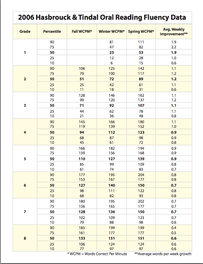|
In the most recent Blogs here at Linguistic Foundations, I presented an adaptation to the Standards for Teachers of Reading created by the International Dyslexia Association. In the PDF file below, I adapted the Teaching Standard that addresses Reading Fluency. Reading Fluency is a complicated component of reading; I hope this PDF provides practical and useful information. Reading Fluency is a fundamental skill of reading. Reading Fluency is the flow of reading that reminds us of natural spoken language. For student to be able to understand what she reads to the best of her ability, she needs to read accurately, and with an easy flow. The photo above is a well-researched document created by Jan Hasbrouck and Gerald Tindal (2006) (and used by the Read Naturally organization) that allows teachers to recognize how fluently a student reads. However, to recognize that a student is not a fluent reader does not give an easy road map to help her become more fluent. Reading is a complex mix of Language and Print-Related skills. Many components lead to fluent reading, starting from when a student is very young. Strong Phonological Awareness, Phonics, and Language Experiences are crucial both at home and at school for a young child. As a student gets older, Automatic Word Reading instruction – both through decoding and sight word knowledge – needs to be in place. Language experience needs to continue to be strong, because the flow of reading emerges from the natural rhythm of language. At later ages, fluency depends on the Word Attack of Multi-syllable Words, as well as an understanding of the meaning of more complex Sentence Structures (and how those sentences blend into Paragraphs). For a young student who is identified as at-risk to be Dyslexic, she needs to receive specific differentiated instruction that emphasizes the above areas of need. If a student is identified later as Dyslexic, the specific areas in which a student struggles needs to be identified, so that instruction can double back and target those needs. Please contact Linguistic Foundations if you have any questions or feedback related to these Blogs. If you recognize weaknesses in your child’s reading, writing, or language skills, I will be happy to speak with you about her profile. Our testing can describe your child’s profile of learning; identify Language-based Learning Disability (including Dyslexia); and help you to create an instructional plan to present to your child’s teaching team. Have a great Holiday Season!! Thank you. Hasbrouck, J. & Tindal, G. A. (2006). Oral reading fluency norms: A valuable assessment tool for reading teachers. The Reading Teacher. 59(7), 636-644.
|
The Latestfrom Archives
May 2018
Categories
|
||||||

 RSS Feed
RSS Feed
